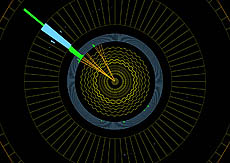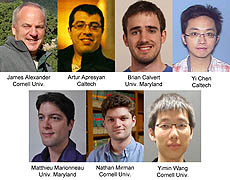Precisely measuring nothing
 |
| Collisions like these indicate the existence of invisible particles. The blob of color in the upper left hand corner shows where particles were knocked out of the collision to deposit energy in the detector. The fact that we see no balancing energy in the lower right hand corner means that an invisible particle has escaped the detector. As the number of simultaneous collisions in the LHC increases, it will become increasingly difficult to study this kind of physics. |
The CMS detector is a technical tour de force. It can simultaneously measure the passage of electrons, pions, muons, photons and all manner of particles, both short-lived and long-lived.
However, there are some particles that simply don't interact very much with matter. These include neutrinos and some hypothetical long-lived and weakly interacting particles that may appear in collisions that probe supersymmetry, extra dimensions of space and dark matter. The CMS detector simply doesn't see those kinds of particles.
That sounds like a terrible oversight, but the reality is more comforting. We can use physical principles of the kind taught in high school physics classes to identify collisions in which these particles are made. Essentially, we see them by not seeing them.
In the first semester of physics, we learn about a quantity called momentum and how it is conserved, which means it doesn't change. In the classical world, momentum is determined by multiplying an object's mass and velocity. In the world of relativity and particles, the definition is a bit different, but the basic idea is the same and the principle that momentum is conserved still applies.
Prior to a collision, particles travel exclusively along the beam direction. This means that before the beam particles collide, there is no momentum perpendicular to the beams, or what scientists call transverse momentum. According to the laws of momentum conservation, there should be zero net transverse momentum after the collision as well. If we sum the transverse momentum of all particles coming out of the collision, that's what we find.
However, when there are undetectable particles, the measured transverse momentum is unbalanced. Scientists call the unobserved transverse momentum missing transverse energy, or MET. MET is a clear signature of the existence of one or more invisible particles. Accordingly, it is important to measure carefully the transverse momentum of all observable particles.
Particle experiments have been employing this technique for decades, but few experiments have operated in the challenging collision environment that exists at the LHC. Any time the beams pass through one another, typically dozens of collisions between beam particles occur. Most often, one of those collisions involve some "interesting" process, while the others usually involve much lower-energy collisions. However, those low-energy collisions still spray particles throughout the detector. The existence of these extra particles confuse the measurement of MET and make it tricky to know the exact momentum of the invisible particles.
CMS scientists have worked long and hard to figure out how to mitigate these effects and recently submitted for publication a paper describing their algorithms. With the impending resumption of operations of the LHC in the spring of 2015 (which could involve as many as 200 simultaneous collisions), researchers will continually revise and improve their techniques.
—Don Lincoln
 |
| These physicists contributed to this paper. |
|